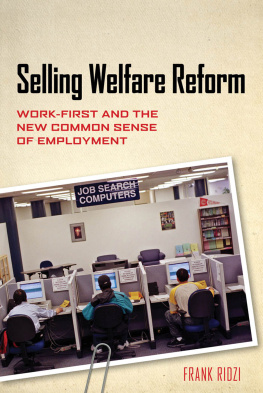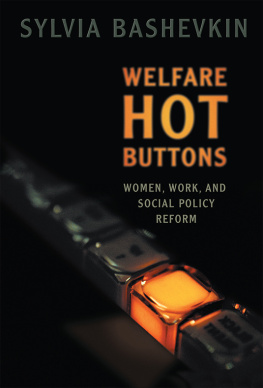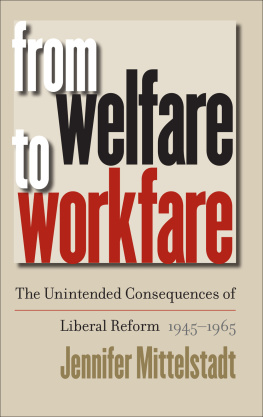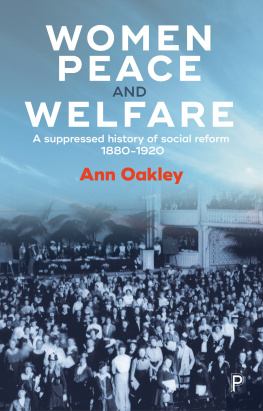Thank you for buying this ebook, published by NYU Press.
Sign up for our e-newsletters to receive information about forthcoming books, special discounts, and more!
Sign Up!
About NYU Press
A publisher of original scholarship since its founding in 1916, New York University Press Produces more than 100 new books each year, with a backlist of 3,000 titles in print. Working across the humanities and social sciences, NYU Press has award-winning lists in sociology, law, cultural and American studies, religion, American history, anthropology, politics, criminology, media and communication, literary studies, and psychology.
Selling Welfare Reform
Selling Welfare Reform
Work-First and the New Common Sense of Employment
Frank Ridzi
NEW YORK UNIVERSITY PRESS
New York and London
www.nyupress.org
2009 by New York University
All rights reserved
Library of Congress Cataloging-in-Publication Data
Ridzi, Frank
Selling welfare reform : work-first and the new common sense of employment / Frank Ridzi.
p. cm.
Includes bibliographical references and index.
ISBN-13: 9780814775936 (cl : alk. paper)
ISBN-10: 0814775934 (cl : alk. paper)
ISBN-13: 9780-814775943 (pb : alk. paper)
ISBN-10: 0814775942 (pb : alk. paper)
1. Public welfareUnited States. 2. Welfare recipients EmploymentGovernment policyUnited Staes. 3. Poor Government policyUnited States. I. Title.
HV95.R53 2009
362.55680973dc22 2008045877
New York University Press books are printed on acid-free paper, and their binding materials are chosen for strength and durability. We strive to use environmentally responsible suppliers and materials to the greatest extent possible in publishing our books.
Manufactured in the United States of America
c 10 9 8 7 6 5 4 3 2 1
p 10 9 8 7 6 5 4 3 2 1
Dedicated to the noble human services workers and administrators in this book and the families they seek to empower.
Contents
Acknowledgments
The late Senator Daniel Patrick Moynihan (D-NY) was keen on assigning extra homework. In our last conversation I expressed concern about a need to carefully and critically consider the pros and cons of neoliberal public policy. As a former student of his, I anticipated his grinning response: Write it up for me! In some ways this manuscript is part of that write-up, though not completed in time for the senator to critique. There were also many others who encouraged and inspired this project and to whom I owe a great debt. First and foremost I must thank my academic mentor and continuing collaborator, Marjorie L. DeVault. Conversations with her, and at times her tag-team approach with Dorothy E. Smith, helped to convince me to rescue this project from the hopelessly broad and make it concrete, grounded, and doable. This project has had many lives and along the way has benefited from the good will and constructive critique of excellent scholars. I thank them in somewhat chronological order.
At Syracuse Universitys Maxwell School, Jackie Johnson, Monisha DasGupta, Bob Bogdan, Sari Knopp Biklen and Gary Spencer all had a hand in helping me to shape the early scope of this project. Scott Allard, Susan Borker, Andrew London, Madonna Harrington-Meyer, Nancy Mudrick, and Diane Murphy all put in countless hours scrutinizing and masterfully offering advice from their public administration, sociology, social work, and feminist perspectives.
I am indebted too to my colleagues from graduate school: Payal Banerjee, Corey Colyer, Cheryl Najarian, Catherine Richards Solomon, Lauren Eastwood, Jeremy Brunson, Charleen Tuchovsky, and Brenda Solomon.
Beyond this, I have been fortunate to also have the support, encouragement, and example of the community of IE (Institutional Ethnography) researchers: Suzanne Vaughn, Paul Luken, Ellen Pence, Joan Acker, Marie Campbell, Tim Diamond, Kamini Maraj Grahame, Alison Griffith, Nancy Jackson, Ellen Scott, Bonnie Slade, Susan Turner, and many others.
Thanks to those who read and commented on all or various parts of this manuscript (most are listed above) including Nancy Naples, Cory Blad, Murali Venkatesh, and Mary Giegengack Jureller. Marys work to make this readable to a nonsociologist was crucial. Also, thanks to Clinton Smith for his excellent bibliographic work, and to Joshua Grant McIntosh for hosting me and my family at Harvard during the final stages of this project.
I would also like to acknowledge support from the Kauffman Foundation and the Center for Urban and Regional Applied Research and the faculty and staff at Le Moyne College. I could not hope for a better group of colleagues. Thanks also go to my editor Ilene Kalish, managing editor Despina Papazoglou Gimbel, and the fine staff at NYU Press.
Finally, and with greatest appreciation, to my partner Jody, who sustained me throughout this project, and to our wonderful children, whose inspiration carried me through and whose nap times allowed the analysis that follows to make it to pen and paper.
1
Selling Work-First
Introduction
Common sense is not something rigid and stationary, but is in continuous transformation, becoming enriched with scientific notions and philosophical opinions that have entered into common circulation. Antonio Gramsci, 1985, 421
PERHAPS the sentiments contained in the following pages, are not yet sufficiently fashionable to procure them general favor; a long habit of not thinking a thing wrong, gives it a superficial appearance of being right, and raises at first a formidable outcry in defence of custom. But tumult soon subsides. Time makes more converts than reason. Thomas Paine, Common Sense, 1791
The philosophy of one century is the common sense of the next.
Henry Ward Beecher
Have you heard about the Republican and the Democrat who were locked in the White House for 20 years? They agreed to reform welfare. During the 1976 presidential campaign, Republican Ronald Reagans stump speech introduced a story about a Cadillac-driving welfare queen from Chicago: She has 80 names, 30 addresses, 12 Social Security cards. Shes got Medicaid, getting food stamps, and she is collecting welfare under each of her names. Her tax-free cash income alone is over $150,000.William Jefferson Clinton made a campaign pledge to end welfare as we know it. Though efforts were made along the way, the convergence of Republican and Democratic platforms culminated in the 1996 welfare reform that was passed by a Republican Congress and Democratic president. Indeed, over those 20 years it seems that nearly everyone came to agree that welfare produced an unacceptable state of affairs. In an age where political partisanship and social polarization are the norm, we can learn a great deal from occasions when opposing agendas coalesce around shared ideas. In this case there are lessons to be gleaned about one of the most powerful tools in the arsenal of an institution common sense.
People have both local and extra-local reasons for doing what they do. By local I mean the everyday decisions that we make about our work and leisure lives. They may be based on interests such as personal preference, needs, or values. Local actions, however, are not completely isolated from the actions of others. To the extent that individual actions are coordinated with each other, we can glimpse the extra-local reasons for our actions such as national identity, economic principles, social values, or, of course, common sense. These extra-local reasons account for the trends in societal behavior that sociologists noticepeoples participation in holidays or civil rights movements, for instance. When individuals do not see any clear self-interest in a situation, it is quite likely common sense that will lead to the course of action chosen. Nevertheless, the social power of common sense to marshal support and action, and the role of institutions in forging it, is routinely overlooked.











